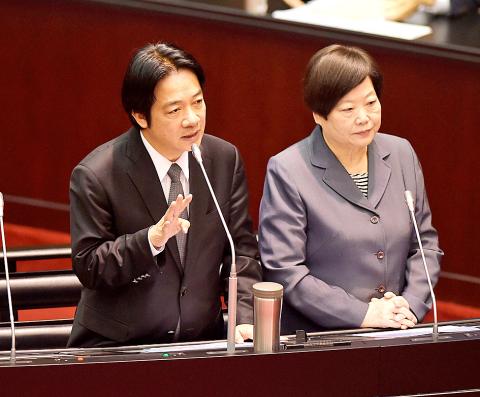Legislators across party lines yesterday criticized the Cabinet’s draft amendments to the Labor Standards Act (勞動基準法), saying that the government risks undoing improvements it has made on workers’ rights by reintroducing poor work conditions.
During a question-and-answer session at the legislature in Taipei, Democratic Progressive Party (DPP) Legislator Chiang Yung-chang (江永昌) asked Premier William Lai (賴清德) to clarify the reason behind the proposed amendments.
The act was amended only 11 months ago, Chiang said, expressing concern that the proposed amendments would harm workers’ rights.

Photo: Huang Yao-cheng, Taipei Times
Lai said that the aim of the amendments is to create a “safe and flexible” work environment for employees, but Chiang said that the premier was being too optimistic.
Average work hours in Taiwan fell three places from third to sixth in the world last year from 2014, Chiang said, asking whether the government wants to abolish the stance it adopted for last year’s amendment — to defend workers’ weekly two days off by raising overtime rates.
If the government wants to help businesses cut operating costs, it can grant them tax reductions, rather than changing the act again, he said.
However, Lai dismissed Chiang’s comment, saying that the key objective of the proposed amendment is to allow more flexibility in labor policies, which cannot be achieved through tax cuts.
KMT Legislator Chen Yi-min (陳宜民) asked Lai whether the amendments will cause the “one fixed day off, one flexible rest day” policy to become a mere justification for canceling seven national holidays.
If so, the amendment would contradict President Tsai Ing-wen’s (蔡英文) campaign promise that the holidays “will not be canceled if it is against workers’ interests,” Chen said.
Saying that netizens have launched a formal online petition to reinstate the holidays, he asked Lai to clarify his stance on the issue, to which the premier responded: “We are still gathering public opinion on this.”
The draft amendments covered by the media this week have drawn criticism that the government is pandering to employers over a rule that, if passed, would allow employers to make employees work 12 days in a row before giving them a two-day break, Chen said.
Meanwhile, KMT Legislator Chiang Wan-an (蔣萬安) on the sidelines of a radio interview said that it is “highly unlikely” that the DPP would reintroduce the seven holidays, which were axed by the party with a “hardline stance” during legislative reviews last year.
Chiang Wan-an, who heads a KMT caucus task force responsible for formulating policies on labor policy amendments, said the caucus supports draft amendments that calculate overtime fees by the actual amount of time employees work, rather than in blocks of four hours.
The caucus also supports proposals by the Ministry of Labor that would allow workers to pass on their annual leave to the next year if it is not used by the end of a year, and to convert remaining compensatory days off into salary payments, he said.
However, it will firmly oppose the draft amendments that would allow employees to work 12 days in a row and reduce the minimum time between shifts from at least 11 to eight hours, Chiang Wan-an said.

The Ministry of Economic Affairs has fined Taobao NT$1.2 million (US$36,912) for advertisements that exceed its approved business scope, requiring the Chinese e-commerce platform to make corrections in the first half of this year or its license may be revoked. Lawmakers have called for stricter enforcement of Chinese e-commerce platforms and measures to prevent China from laundering its goods through Taiwan in response to US President Donald Trump’s heavy tariffs on China. The Legislative Yuan’s Finance Committee met today to discuss policies to prevent China from dumping goods in Taiwan, inviting government agencies to report. Democratic Progressive Party Legislator Kuo Kuo-wen (郭國文) said

The Ministry of Economic Affairs has fined Taobao NT$1.2 million (US$36,900) for advertisements that exceeded its approved business scope and ordered the Chinese e-commerce platform to make corrections in the first half of this year or its license would be revoked. Lawmakers have called for stricter supervision of Chinese e-commerce platforms and more stringent measures to prevent China from laundering its goods through Taiwan as US President Donald Trump’s administration cracks down on origin laundering. The legislature’s Finance Committee yesterday met to discuss policies to prevent China from dumping goods in Taiwan, inviting government agencies to report on the matter. Democratic Progressive Party

Taiwan and its Pacific ally Tuvalu on Tuesday signed two accords aimed at facilitating bilateral cooperation on labor affairs, according to Taiwan’s Ministry of Foreign Affairs (MOFA). The governments inked two agreements in Taipei, witnessed by Foreign Minister Lin Chia-lung (林佳龍) and visiting Deputy Tuvaluan Prime Minister Panapasi Nelesone, MOFA said in a news release. According to MOFA, the agreements will facilitate cooperation on labor issues and allow the two sides to mutually recognize seafarers’ certificates and related training. Taiwan would also continue to collaborate with Tuvalu across various fields to promote economic prosperity as well as the well-being of their

Sung Chien-liang (宋建樑), who led efforts to recall Democratic Progressive Party (DPP) Legislator Lee Kun-cheng (李坤城), was released on bail of NT$80,000 today amid outcry over his decision to wear a Nazi armband to questioning the night before. Sung arrived at the New Taipei District Prosecutors’ Office for questioning in a recall petition forgery case last night wearing a red armband bearing a swastika, carrying a copy of Adolf Hitler’s Mein Kampf and giving a Nazi salute. Sung left the building at 1:15am without the armband and covering the book with his coat. Lee said today that this is a serious